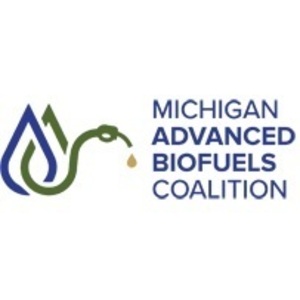MSC launches Michigan Advanced Biofuels Coalition

July 11, 2022
BY Michigan Soybean Committee
In a move to foster energy security, cleaner air and more sustainable transportation, the Michigan Soybean Committee is pleased to announce formation of the Michigan Advanced Biofuels Coalition (MiABC). The new coalition promotes the use of advanced biofuels, including biodiesel, renewable diesel and sustainable aviation fuel (SAF). Produced from renewable resources, such as soybean oil and used cooking oil, these fuels reduce lifecycle emissions from diesel vehicles and aircraft by 50 percent or more compared to petroleum-based fuels.
“MiABC provides education, technical expertise and other resources to help public and private fleets take full advantage of the many benefits of advanced biofuels,” says Janna Fritz, chief executive officer of the Michigan Soybean Committee. Funding for MiABC comes from Michigan farmers through the soybean checkoff program.
“Our organization is excited to lead the way to expand adoption of cleaner-burning advanced biofuels in Michigan,” Fritz says. “Advanced biofuels provide simple and cost-effective ways for Michigan communities and fleets to meet carbon reduction goals without investing in additional resources or infrastructure. And these fuels provide new markets for soybeans grown in our state.”
MiABC Stakeholders
Twelve organizations are initial stakeholders in MiABC. By joining the coalition, the stakeholders signal their commitment to improving Michigan communities through heightened energy security, cleaner air and a healthier environment.
Michigan-based stakeholders in MiABC are:
•Michigan Soybean Committee, St. Johns, Michigan. This farmer-led organization directs the soybean checkoff program in Michigan. The Michigan Soybean Committee manages checkoff resources to increase return on investment for 12,000 Michigan soybean farmers, while enhancing sustainable soybean production.
•Michigan Soybean Association, St. Johns, Michigan. The Michigan Soybean Association is a membership organization that advocates for soybean farmers’ interests in both Lansing, Michigan, and Washington, D.C.
Advertisement
•Clean Fuels Michigan, Lansing, Michigan. Clean Fuels Michigan (CFM) brings together stakeholders from across the clean transportation industry to show a unified force for the industry. CFM advocates for a suite of alternative fuels including biofuels, hydrogen, propane, natural gas and electric vehicles.
•Cooperative Elevator Co., Pigeon, Michigan. Cooperative Elevator Co. has served diverse farmers in Michigan’s Thumb region for more than 100 years and provides value-added products and services to meet customers’ agricultural and energy needs. Committed to sustainability, Cooperative Elevator Co. was named Michigan’s 2017 Outstanding Green Agribusiness.
•Michigan Clean Cities, East Lansing, Michigan. Michigan Clean Cities helps promote and expand the use of clean transportation options in Michigan. The organization works to address the national challenge of petroleum dependence through activities that grow the market for alternative fuels and advanced vehicles. Membership is open to anyone interested in cleaner fuels, vehicles and practices to reduce petroleum use.
•Third Coast Commodities, LLC, Buchanan, Michigan. Third Coast Commodities provides service to over 200 companies nationally and internationally in the broader Fats, Oils and Grease (FOG) industry, commercial crush, biofuels, restaurant recycling, oleo chemical, animal feed and heating oil markets. Above all, Third Coast aims to give clients insight and certainty in trading their industry by-products while ensuring ease of transaction.
Advertisement
•Thumb BioEnergy, Sandusky, Michigan. Thumb BioEnergy collects used cooking and frying oil from more than 800 restaurants across Michigan and converts it into clean-burning biodiesel fuel. In operation since 2009, Thumb BioEnergy is a certified BQ-9000 biodiesel producer that has been demonstrating its commitment to providing high-quality biodiesel fuel to Michigan’s Thumb region and beyond.
•W2 Fuel LLC, Adrian, Michigan. W2 Fuel is a growing biofuel manufacturer with locations in Michigan and Iowa and partners and customers across the United States. The company has been a premier biodiesel producer in the Great Lakes Region since 2005 and is BQ-9000 certified for biodiesel quality assurance.
MiABC stakeholders outside of Michigan are: Clean Fuels Alliance America, Jefferson City, Missouri; Groen Solutions, LLC, Springfield, Illinois; Indigenous Energy, Inc., Chicago, Illinois; and MARC-IV Consulting, Kearney, Missouri.
Future Optimism
MiABC stakeholder Leon Jackson, founder and co-owner of Thumb BioEnergy, is optimistic about the long-term potential for biodiesel fuel in Michigan, especially in the medium and heavy-duty sectors. “Electricity use will grow in the transportation sector, but we will still need substantial amounts of liquid fuels, including biodiesel, for certain applications. Biodiesel has the capability to help fill that need in a way that achieves a low carbon index,” Jackson says.
Related Stories
The U.S. Energy Information Administration maintained its forecast for 2025 and 2026 biodiesel, renewable diesel and sustainable aviation fuel (SAF) production in its latest Short-Term Energy Outlook, released July 8.
XCF Global Inc. on July 10 shared its strategic plan to invest close to $1 billion in developing a network of SAF production facilities, expanding its U.S. footprint, and advancing its international growth strategy.
U.S. fuel ethanol capacity fell slightly in April, while biodiesel and renewable diesel capacity held steady, according to data released by the U.S. EIA on June 30. Feedstock consumption was down when compared to the previous month.
XCF Global Inc. on July 8 provided a production update on its flagship New Rise Reno facility, underscoring that the plant has successfully produced SAF, renewable diesel, and renewable naphtha during its initial ramp-up.
The USDA’s Risk Management Agency is implementing multiple changes to the Camelina pilot insurance program for the 2026 and succeeding crop years. The changes will expand coverage options and provide greater flexibility for producers.
Upcoming Events










